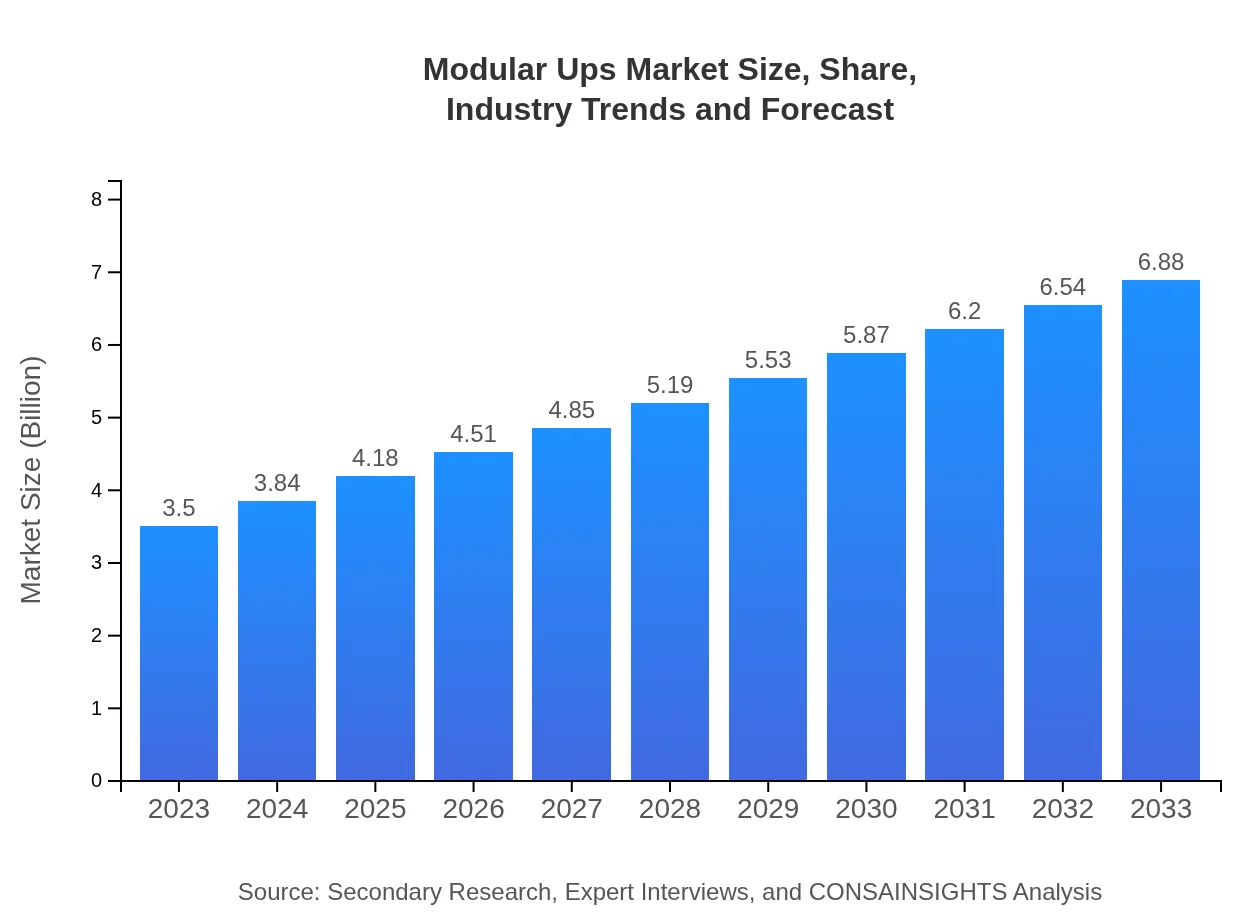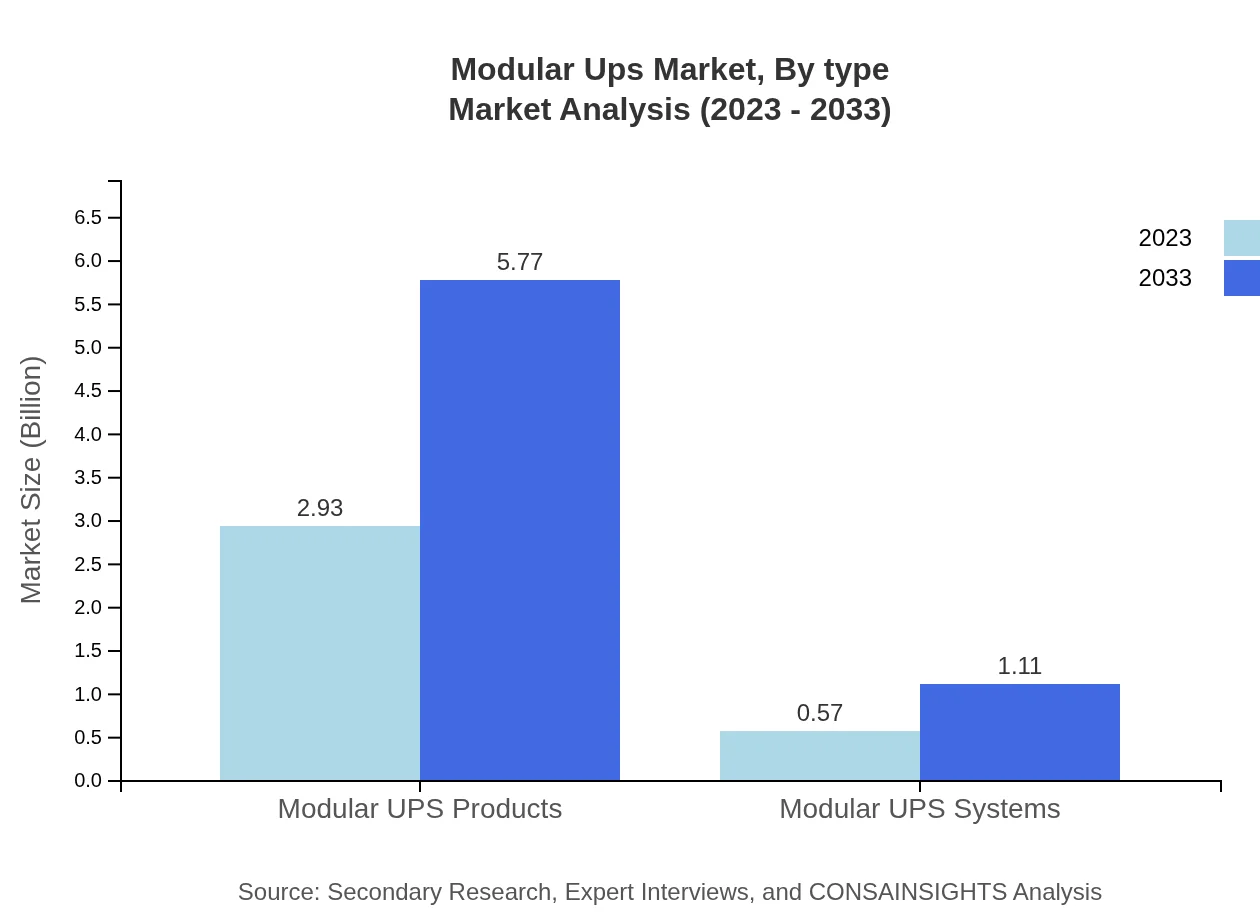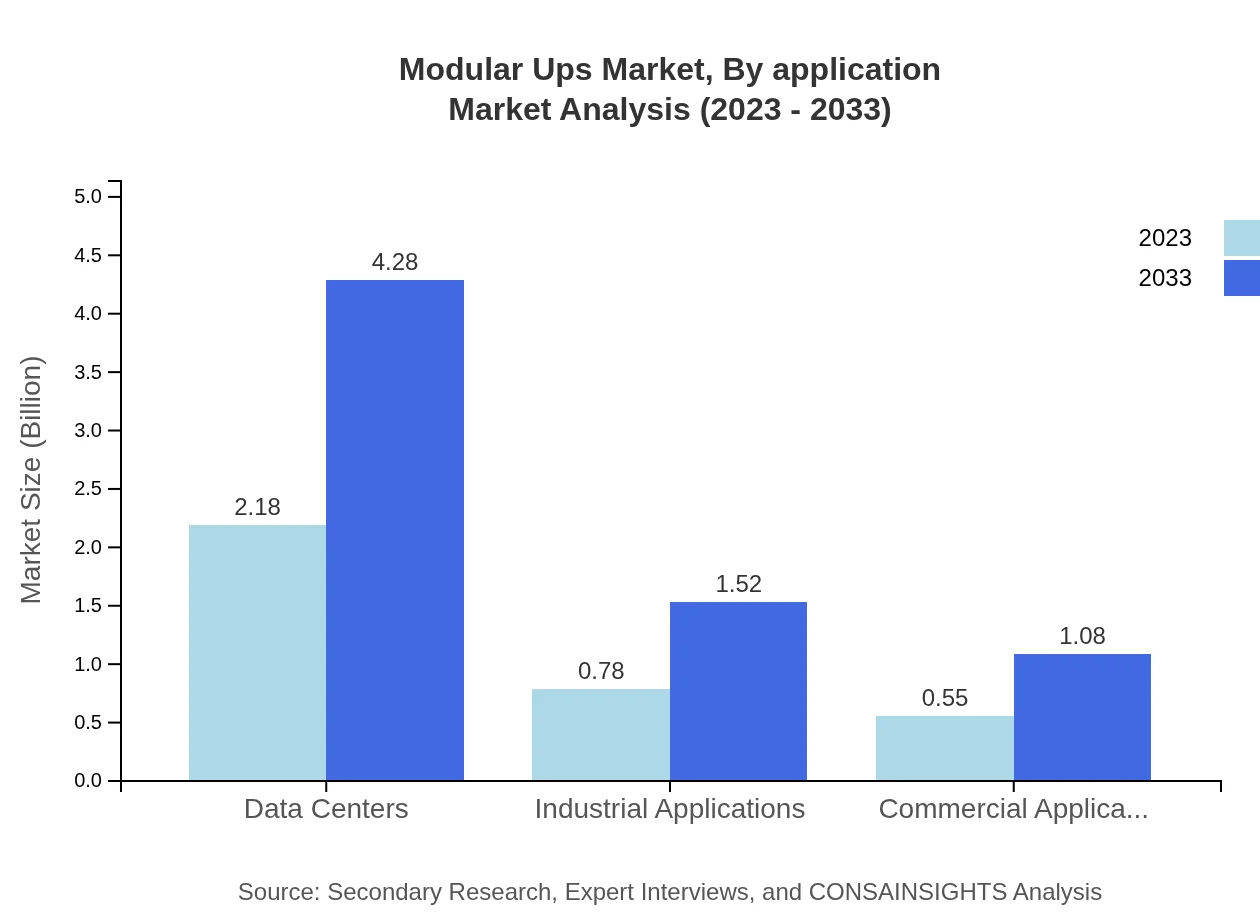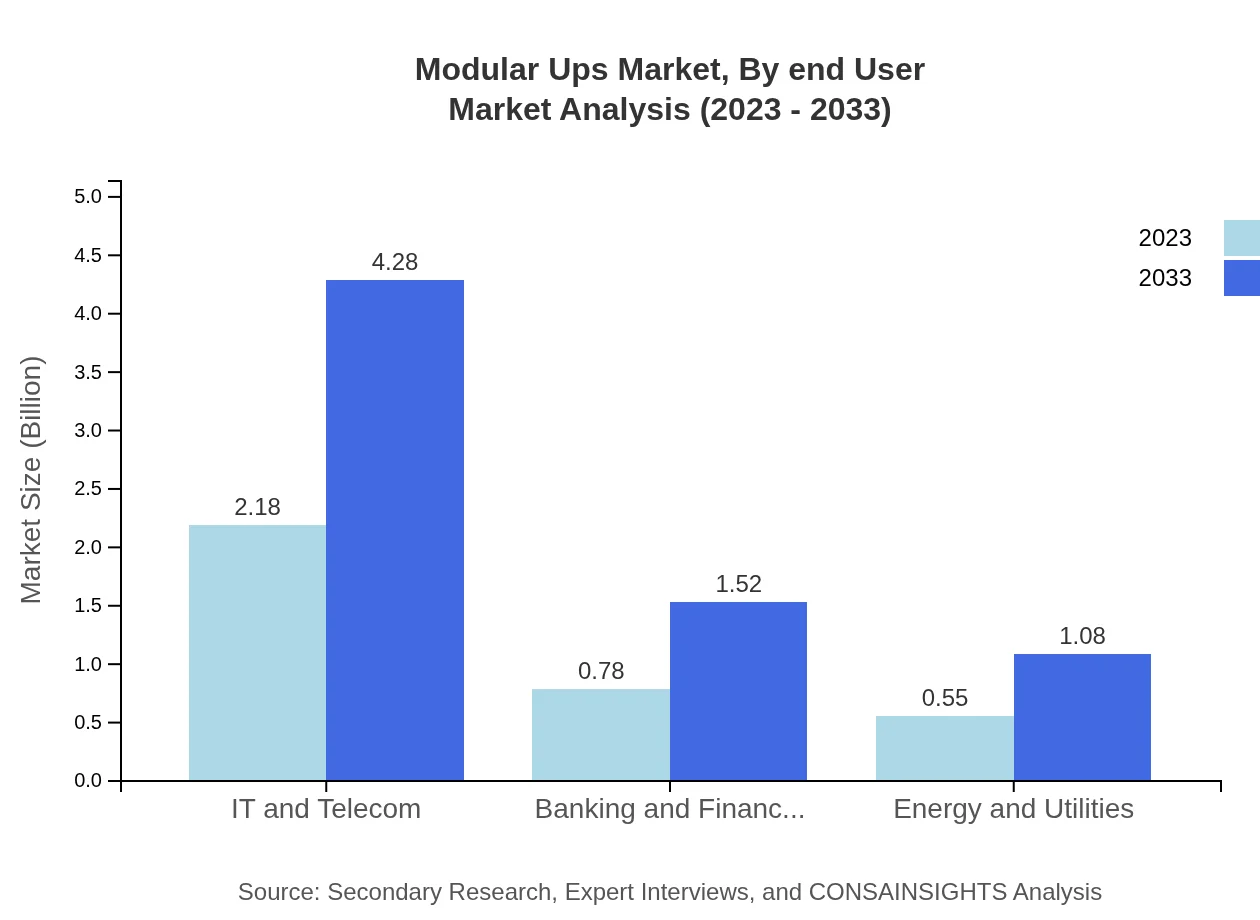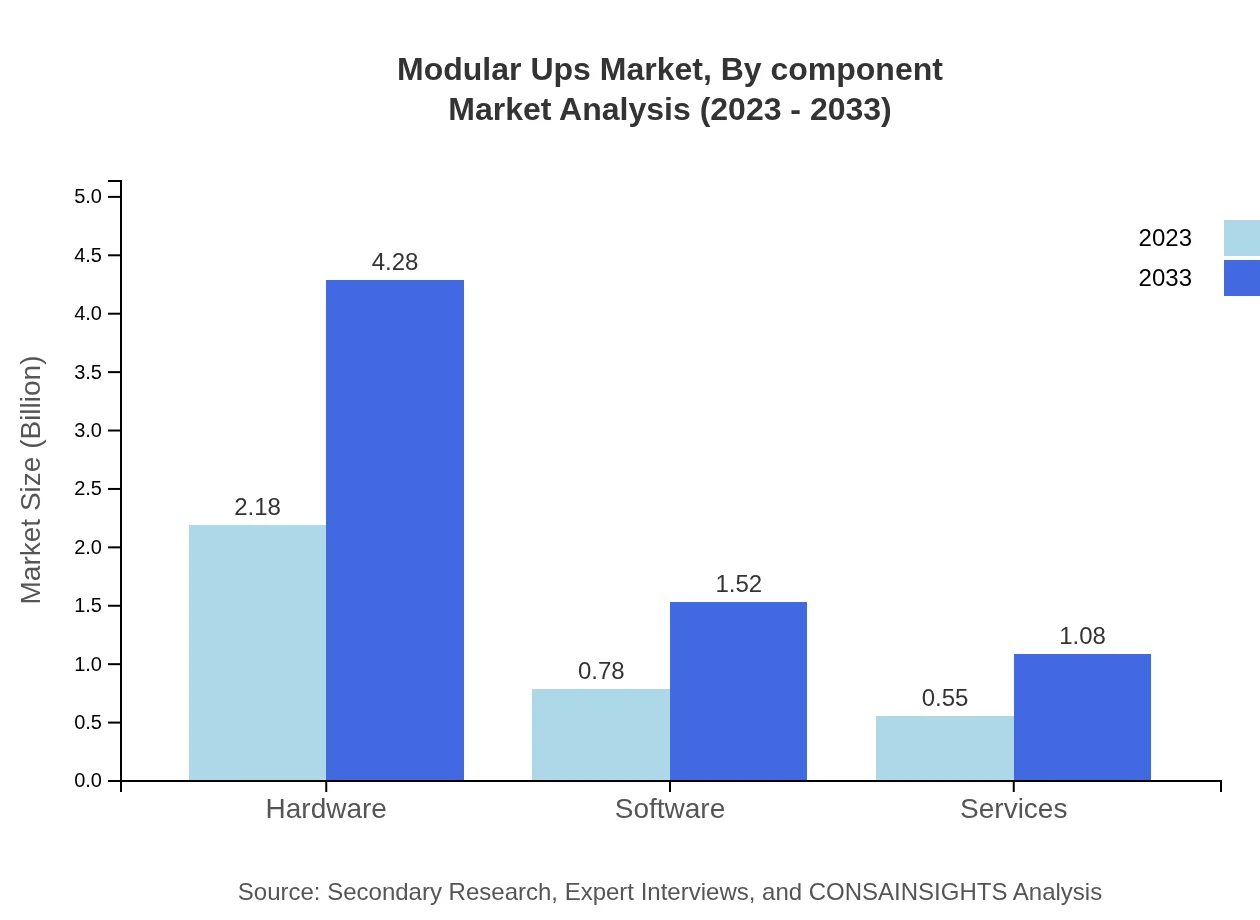Modular Ups Market Report
Published Date: 31 January 2026 | Report Code: modular-ups
Modular Ups Market Size, Share, Industry Trends and Forecast to 2033
This report provides a comprehensive overview of the Modular UPS market, including market insights, analysis of trends, regional performance, segmentation by applications and types, and forecasts for the years 2023 to 2033.
| Metric | Value |
|---|---|
| Study Period | 2023 - 2033 |
| 2023 Market Size | $3.50 Billion |
| CAGR (2023-2033) | 6.8% |
| 2033 Market Size | $6.88 Billion |
| Top Companies | Schneider Electric, Eaton Corporation, Vertiv, ABB Ltd., Riello UPS |
| Last Modified Date | 31 January 2026 |
Modular Ups Market Overview
Customize Modular Ups Market Report market research report
- ✔ Get in-depth analysis of Modular Ups market size, growth, and forecasts.
- ✔ Understand Modular Ups's regional dynamics and industry-specific trends.
- ✔ Identify potential applications, end-user demand, and growth segments in Modular Ups
What is the Market Size & CAGR of Modular Ups market in 2023?
Modular Ups Industry Analysis
Modular Ups Market Segmentation and Scope
Tell us your focus area and get a customized research report.
Modular Ups Market Analysis Report by Region
Europe Modular Ups Market Report:
The European Modular UPS market is estimated to expand from $0.95 billion in 2023 to $1.87 billion in 2033, as the region witnesses a surge in renewable energy projects and growing commitment to energy efficiency. Regulatory support for greener technologies will also underpin the market growth, alongside the increasing penetration of data centers.Asia Pacific Modular Ups Market Report:
In the Asia Pacific region, the Modular UPS market is projected to grow from $0.69 billion in 2023 to $1.36 billion by 2033. The increasing urbanization, alongside the rapid industrialization in countries such as China and India, plays a vital role in driving this growth. Additionally, the rise in data centers due to digitization is further amplifying the demand for robust power systems.North America Modular Ups Market Report:
In North America, a significant growth from $1.24 billion in 2023 to $2.44 billion by 2033 is forecasted. The market is primarily driven by advancements in technology and the presence of major data centers across the region. The rapid adoption of cloud services among businesses also contributes to the increasing need for Modular UPS systems.South America Modular Ups Market Report:
The South American market is expected to grow from $0.24 billion in 2023 to $0.48 billion in 2033, fueled by increasing investments in the telecommunications sector and the expansion of data centers. As governments focus on upgrading infrastructure, the demand for reliable power solutions is projected to rise, creating opportunities for Modular UPS systems.Middle East & Africa Modular Ups Market Report:
In the Middle East and Africa, the market is projected to grow from $0.37 billion in 2023 to $0.74 billion by 2033. The demand for reliable back-up power solutions in various sectors, particularly in the oil and gas industry, is a critical driver. Furthermore, regional investments in infrastructure and increasing concern over power outages are also facilitating market expansion.Tell us your focus area and get a customized research report.
Modular Ups Market Analysis By Type
The Modular UPS Products segment is projected to grow from $2.93 billion in 2023 to $5.77 billion in 2033, representing a significant share of 83.85% in both years. Meanwhile, the Modular UPS Systems segment is anticipated to increase from $0.57 billion to $1.11 billion, holding a smaller share of 16.15% during the same period. This differentiation underscores the predominant role of products in driving market growth.
Modular Ups Market Analysis By Application
The IT and Telecom sector accounts for $2.18 billion in 2023 and is expected to reach $4.28 billion by 2033, commanding a share of 62.18%. Banking and Financial Services, Energy and Utilities, and other applications like Data Centers also represent substantial segments, with shares of 22.15%, 15.67%, and 62.18% respectively, underscoring the necessity of reliable power supply in critical infrastructure.
Modular Ups Market Analysis By End User
The Modular UPS market showcases distinct performance across various end-user sectors, with the IT and Telecom segment holding the largest market share at 62.18% in 2023, valued at $2.18 billion and projected to double by 2033. Other significant end-users include banking, financial services, and commercial applications, all contributing to the market's overall viability.
Modular Ups Market Analysis By Component
The Modular UPS market by component indicates a dominant share held by hardware, accounting for $2.18 billion in 2023 and projected to grow to $4.28 billion by 2033. The software component and services segments also contribute notable shares, with a focus on integrating advanced management capabilities and offering ongoing support to end-users in ensuring system longevity.
Modular Ups Market Trends and Future Forecast
Tell us your focus area and get a customized research report.
Global Market Leaders and Top Companies in Modular Ups Industry
Schneider Electric:
A leading global company specializing in energy management and automation, Schneider Electric provides innovative Modular UPS solutions designed for efficiency and reliability.Eaton Corporation:
Eaton is known for its robust power management solutions, including Modular UPS systems targeted for critical applications in various sectors.Vertiv:
Vertiv specializes in technologies for critical power, cooling, and digital infrastructure, offering Modular UPS solutions that support operational continuity for businesses.ABB Ltd.:
ABB is a leader in digital industries, providing a range of Modular UPS systems focused on sustainable technology and efficient energy management.Riello UPS:
Riello UPS designs and manufactures high-performance UPS solutions, providing modular systems that meet diverse power needs, especially in data environments.We're grateful to work with incredible clients.









FAQs
What is the market size of Modular UPS?
The Modular UPS market is valued at approximately $3.5 billion in 2023, with a projected CAGR of 6.8%, indicating robust growth over the next decade. This upward trajectory underlines the increasing demand for efficient power solutions across various industries.
What are the key market players or companies in the Modular UPS industry?
The Modular UPS industry features several key players including Schneider Electric, Eaton Corporation, Vertiv Co., and Mitsubishi Electric Corporation. These companies provide innovative solutions, catering to diverse sectors such as telecommunications, data centers, and commercial applications.
What are the primary factors driving the growth in the Modular UPS industry?
Key drivers for Modular UPS growth include rising demand for uninterrupted power supply, increasing data center operations, and the expansion of renewable energy initiatives. These factors create a surging need for scalable and efficient power solutions.
Which region is the fastest Growing in the Modular UPS market?
Asia-Pacific is the fastest-growing region in the Modular UPS market, with a growth forecast from $0.69 billion in 2023 to $1.36 billion by 2033. This growth is fueled by rapid industrialization and the adoption of advanced technologies.
Does ConsaInsights provide customized market report data for the Modular UPS industry?
Yes, ConsaInsights offers customized market report data tailored to specific needs within the Modular UPS industry. This includes in-depth analysis, regional insights, and competitive benchmarking to facilitate informed decision-making.
What deliverables can I expect from this Modular UPS market research project?
From the Modular UPS market research project, you can expect comprehensive reports detailing market size, growth forecasts, competitive landscape analysis, and insights into consumer preferences. This equips stakeholders with valuable information for strategic planning.
What are the market trends of Modular UPS?
Current trends in the Modular UPS market include an increasing shift towards eco-friendly solutions, advanced digitalization of power management systems, and the rising integration of IoT technology for predictive maintenance and enhanced efficiency.

